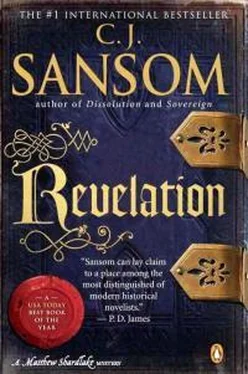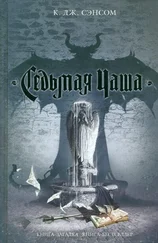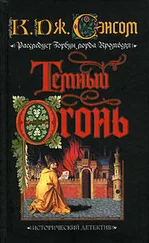There were murmurs of agreement up and down the table. In the years since Thomas Cromwell’s fall, the King’s patronage of the reformers who had encouraged him to break with Rome had ended. He had never fully endorsed Lutheran beliefs, and now he was moving gradually back to the old forms of religion, a sort of Catholicism without the Pope, with increasingly repressive measures against dissentients; to deny that the bread and wine of the sacrament were transformed into the actual body and blood of Jesus Christ was now a heresy attracting the death penalty. Even the doctrine of purgatory was becoming respectable again. All this was anathema to the radicals, for whom the only truth was to be found in the Bible. The persecution had only driven many reformers towards the radical fringes, and in London especially they were daring and vocal.
‘Do you know what I saw in the street today?’ another guest said. ‘Outside one church people were laying branches in the snow for the Palm Sunday ceremonies tomorrow. Then a rabble of apprentices appeared and kicked the branches away, calling out that it was a papist ceremony and the Pope was the Antichrist!’
‘This religious radicalism gives apprentices another excuse to run wild,’ Loder observed gloomily.
‘There could be trouble tomorrow,’ Roger said.
I nodded. On Palm Sunday the traditional churches would be having the usual ceremonies, the churchwardens dressed as prophets and a child riding in on a donkey, while the radical preachers in their churches would be calling it papist blasphemy.
‘There’ll be another purge,’ someone said gloomily. ‘I’ve heard rumours Bishop Bonner is going to crack down hard on the Bible-men.’
‘Not more burnings,’ Dorothy said quietly.
‘The city wouldn’t stand for that,’ Loder said. ‘People don’t like the radicals, but they like burnings less. Bonner won’t go that far.’
‘Won’t he?’ Roger said quietly. ‘Isn’t he a fanatic too, on the other side? Isn’t the whole city becoming divided?’
‘Most people only want a quiet life,’ I said. ‘Even those of us who were once radicals.’ I smiled wryly at Roger. He nodded in acknowledgement.
‘Fanatics on both sides,’ old Ryprose said gloomily. ‘And all we poor ordinary folk in the middle. Sometimes I fear they will bring death to us all.’
THE COMPANY broke up late, and I was one of the last to leave. I stepped out into a night that had become colder again, refrozen slush crunching under my boots. My mood was much less cheerful after the conversation round the dinner table. It was true that London was full of both beggars and fanatics now, an unhappy city. And a purge would make things worse. There was, too, something I had not told the company; the parents of the boy in the Bedlam were members of a radical Protestant congregation, and their son’s mental problems were religious in nature. I wished I had not had to take the case, but I was obliged to deal with the Requests cases that were allocated to me. And his parents wanted their son released.
I paused. A quiet footstep, crunching on the slush behind me. I turned, frowning. The precincts of Lincoln’s Inn were supposed to be secure, but there were places where entry could be gained. The night was dark, the moon half hidden by clouds, and at this hour only a few lighted windows cast squares of light on the snow.
‘Who’s that!’ I called.
There was no reply, but I heard the slush crackling again as someone walked rapidly away. Frowning, I followed. The sound came from the far end of the building where the Elliards lived; it adjoined the rear wall of Lincoln’s Inn. I put my hand to my dagger as I rounded the corner of the building. The outer wall was ahead of me. Whoever was there was trapped. But no one was there. The little square of ground between the buildings and the twelve-foot-high rear wall, lit by the windows of the Elliards’ apartment, was quite empty. A shiver trickled down my spine.
Then I saw the snow on top of the wall had been disturbed. Whoever it was had climbed over. I stood and stared; to scale that wall would require a good deal of strength and agility. I was not sure I would have said it was possible, but the empty yard and the disturbed snow told their own tale. I frowned and turned away; I would tell the watchman that broken glass should be set atop the wall.
NEXT MORNING I set out early for my chambers; the parents of the boy who had been put in the Bedlam were due at nine. The details the Court of Requests had sent me were sketchy, but enough to be worrying. The Privy Council itself had put him there, ‘for blaspheming true religion in his madcap frenzy’, as their resolution put it, without even an indictment in the bishop’s court. The matter was therefore political, and dangerous. I tried to reassure myself again that any involvement I had would be in a purely legal capacity, but cursed the luck that had sent this case to me rather than to my fellow-pleader.
The papers described the boy, Adam Kite, as the son of a master stonemason and a communicant at St Martin’s church, Creek Lane. I had got Barak to investigate and he had reported back that the vicar was, as he put it, a ‘great railer and thunderer’.
This was unwelcome news. In the dealings I had had with the godly men I had found them difficult to deal with, crude hard men who drove at you with biblical verses like a carpenter hammering in nails.
I was jerked from my worrisome thoughts as I slipped on a patch of slush and almost fell over. Somebody laughed.
All over the city, church bells were ringing for the Palm Sunday services. These days I only went to church when it was expected; next Sunday I would have to take Mass and make my annual confession. I was not looking forward to it. The topsy-turvy weather was warmer again, and Chancery Lane was muddy as a farmyard. As I passed under Lincoln’s Inn Gatehouse I wondered if the Treasurer would do anything to secure that wall. I had told the gatekeeper to inform him of my near-encounter last night.
I felt something wet hit my face; another drop followed and I realized it was raining, the first rain after two months of snow. By the time I reached my chambers it was coming on heavily and my cap was soaked. To my surprise, Barak was already in the outer office. He had lit the fire and sat at the big table, getting papers in order for tomorrow’s court session. Plaints, affidavits and statements were piled around him. His handsome, impish features looked tired, his eyes bloodshot. And his face was stubbly.
‘You need to get a shave, or the judge will be calling you out for a disrespectful demeanour.’ Though I spoke roughly, Barak and I had a fast friendship. We had originally come together on an assignment for Barak’s late master, the King’s Minister Thomas Cromwell. After Cromwell’s execution three years before, Barak had come to work for me, an unorthodox assistant but an efficient one.
‘All right,’ he said grumpily. ‘The madwag’s parents are due soon.’
‘Don’t call him that,’ I said as I looked through the papers he had prepared. Everything was in order, annotations made in Barak’s spidery handwriting. ‘In on Sunday?’ I asked. ‘You were here yesterday too? You are neglecting poor Tamasin.’
‘She’s all right.’ Barak rose and began filing away books and papers. I looked at his broad back, wondering what was wrong between him and his wife that he should thus drag out his time at work and, by the look of him, stay out all night. Tamasin was a pretty girl, as spirited as Barak, and he had been happy to marry her last year even though they had been forced into a speedy wedding by her pregnancy. Their son had died the day he was born and in the months since, though Barak had been as cheerfully irreverent as ever, there was often something forced about his banter, at times something haunted in his eyes. I knew the loss of a child could bring some couples closer, but drive others apart.
Читать дальше








![К Сэнсом - Стенание [другой перевод]](/books/432043/k-sensom-stenanie-drugoj-perevod-thumb.webp)

